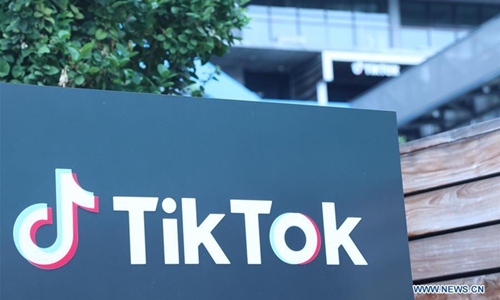TikTok’s US destiny up in the air as divestment deadline looms
By Zhang Hongpei Source: Global Times Published: 2020/11/11 18:13:40

Photo taken on August 21, 2020 shows a logo of the video-sharing social networking company TikTok's Los Angeles Office in Culver City, Los Angeles County, the United States. TikTok confirmed Saturday that it will file a lawsuit against the Trump administration over an executive order banning any U.S. transactions with its parent company ByteDance. (Xinhua)
TikTok and its Chinese parent ByteDance filed a new petition to US court on Tuesday (US time) as a defensive move against US President Donald Trump's second executive order targeted at the video-sharing app, which is set to take effect on Thursday.Even though the Trump campaign is busy filing lawsuits in its bid to reverse the outcome of the presidential election, the president's executive order still hangs like a sword of Damocles over the head of TikTok, lawyers and industry analysts told the Global Times on Wednesday.
The divestment order and the Committee on Foreign Investment in the US (CFIUS) action seek to compel the wholesale divestment of TikTok in the US, based on Trump administration's purported national security review of a three-year-old transaction that involved Musical.ly -- a transaction that did not include the core technology or other aspects of the TikTok business that have made it successful — and yet the executive order now seeks to compel ByteDance to divest TikTok, according to the petition.
"Facing continual new requests and no clarity on whether our proposed solutions would be accepted, we requested the 30-day extension that is expressly permitted in the August 14 order," TikTok said in a statement.
"Today, with the November 12 CFIUS deadline imminent and without an extension in hand, we have no choice but to file a petition in court to defend our rights and those of our more than 1,500 employees in the US".
Trump issued a second executive order at the advice of the CFIUS on August 14, directing ByteDance to divest TikTok within 90 days — a deadline that falls on Thursday. TikTok now has more than 100 million users in the US.
Zhang Lei, senior joint partner at Beijing DHH Law Firm, told the Global Times on Wednesday that TikTok cannot feel safe because the second order is still there, even though the company has won victory twice in the courts after two US judges ruled in favor of TikTok.
A federal judge in Washington DC granted an injunction against the TikTok app download ban on September 27, and a different federal judge in Pennsylvania issued an injunction at the end of October against the prohibitions of any transaction with TikTok that would take effect on Thursday, after three TikTok creators won the case, bringing a temporary end to Trump's first executive order.
"To look at it positively, the case is still a question whether the Trump administration would have time to deal with a Chinese firm as most of the focus has shifted to the election," Zhang said, adding that maybe the US Commerce Department would one day take a step back.
It is not likely for Trump to deal a blow to TikTok at the moment, by making it unable to provide any services in the US, a move that might come prior to the enforced divestment, because it would add woes to the disadvantage from the election result, said Shen Yi, a professor at the School of International Relations and Public Affairs of Fudan University.
Shen told the Global Times on Wednesday that regardless of who will enter the White House, Chinese companies should not make their decisions based on that outcome.
"Don't hold any illusions. Calmness and alertness are needed at the moment to prepare for any US moves against Chinese firms."
China's Foreign Ministry spokesperson Wang Wenbin said at a press briefing on Thursday that China opposes the US abusing the concept of national security and using its state apparatus to groundlessly crack down on foreign companies.
The spokesperson urged the US to respect market economy principles and the rules of fair competition. The US government should observe international norms and offer a non-discriminatory business environment for foreign companies operating in the US, Wang said.
Posted in: COMPANIES,BIZ FOCUS